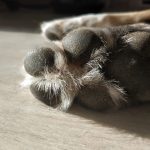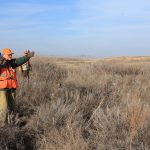First Season – Is Your Pointing Dog Ready?
Of all the important “firsts” that your pointing dog pup will experience, his first season will be the one most profound, the one most instrumental in his development as a bird dog. Here are some common questions we’ve been asked over the years that should help you develop your pup into a class bird dog.
How old should my young pointing dog be to hunt him his first season?
Generally, we like a pup to be at least nine months of age for his first season, although we’ve had a few pups that have shown their abilities and readiness at six months of age. Key word here is pup – his introduction to the world of hunting needs to be mindful and positive, avoiding issues that could create confusion or fear. He’s like a kindergarten kid whose experiences keep him eager to come back to school each day. So, though he may seem ready to you, it’s crucial to plan this first season by reviewing our tips in this article and by watching your pup for his reactions as he experiences his first season.
What should he be doing to show he is ready?
Age of the pup is not as important as the foundation work you’ve laid with your young dog. Does he have a good understanding of the basic commands of heel, whoa, and here (come)? Has he had plenty of field and bird work and been properly developed to the gun? Has he learned about handling in the field and does he respond fairly well? Most important – is he bird crazy and hunting with enthusiasm when you have him out in the field? These are the qualities that show you that your pup is ready. A lack of drive and motivation can prove disastrous. Good genetics play an important part in this, but proper bird introduction and gun development play major roles as well.
Does pup need to point?
If your pup is not pointing well, but hunts with joy and abandon, don’t worry about his point right now. If he shows softness or lack of intensity or style on point, don’t worry. We’ve seen dogs who are late developers become classic pointers as they mature. Lots of bird work – particularly on wild birds that are spooky and fly well – will usually solve this issue and bring out the point in young, inexperienced dogs.
Does he need to retrieve?
Pup doesn’t have to retrieve in order to start him on his first season. Some young pointing dogs don’t seem to be natural retrievers, but they may start retrieving on their own after a few seasons of hunting. Others may retrieve well in their first season, especially if they are natural retrievers. Some dogs just love to pick up the bird; others would rather leave it and continue hunting. Don’t make this an issue in the first couple of seasons. If your dog doesn’t retrieve naturally as time progresses, you might think about teaching him the trained retrieve (our preferred name for force-breaking to retrieve). We don’t recommend this training until pup has been hunted at least a season or two. If you’re not the patient type, we recommend finding a trainer who specializes in gentle retrieving training to do the job. If this training isn’t done correctly, it can backfire and turn a potential top-notch dog off of birds entirely. So, early on, don’t worry about pup’s retrieve, especially in his first season. A good resource are our two-part articles, “The Trained Retrieve (Parts One and Two)” in the March/April and May/June 2001 issues of The Pointing Dog Journal.
Does pup need to be gun broke?
Yes, yes, yes! Most gun-shy problems are man-made. It’s much easier to take the time needed to follow a program of gentle gun introduction and progression than to try and cure a man-made gun-shy problem. As veteran trainers who have handled many gun-shy dogs brought to us over the years to “cure,” we regret to say that not all of them can be cured. So, remember the ounce of prevention versus the pound of (possible) cure – and take the time to develop your pup correctly to the gun. There are good training books and videos out there to help you, or check out our article, “The Gun-Shy Pointing Dog,” in the July/August 1999 issue of The Pointing Dog Journal.
What should I avoid doing in pup’s first season?
First off, don’t hunt your young dog on opening day! Personally, we never hunt in groups and this is especially important with first-year dogs. During this first season, use one gun only per hunt and no more than one or two shots per bird at a time. Shooting is only done in conjunction with bird work; if you shoot a bird that your pup is not working, you may create a problem and even cause him to stop hunting. This can often happen when you are hunting in a group and have no control over what the others in the group are doing. It’s also a good idea to hunt with a trustworthy partner who can shoot the bird while you focus on handling your young dog.
Don’t hunt a young dog for long periods of time in bad weather or adverse conditions, or where the area is unproductive and he is not finding birds. This is where game preserves come in. If you can get away on a quiet weekday, the game preserve is an ideal place to take your young dog. He’s sure to find birds and you can have your own personal “training area” to polish up your pup’s developing skills.
Initially, until your pup lets you know he’s eager and ready for more, your hunts should be kept shorter rather than too long. You don’t want to overdo anything at the start. Keep hunts shorter and successful and focus on the pup and what he’s learning, not the birds in the bag.
What are some indicators that my pup is having a problem?
Problems can (and often will) come up during pup’s first season. That’s okay! As long as you are observant and watching for issues that can develop, you can address them before they become major problems.
Some indicators to watch for are a pup that stops hunting and starts to hang close to your side, or a pup that begins to avoid the birds that you know are there (blinking). When pup shows these signs, he’s letting you know he’s had a negative experience that is causing him to lose his enthusiasm and quit hunting for the birds. Perhaps he’s been spooked by too many guns overhead when a bird is flushed and shot. Maybe he’s been spurred by a crippled rooster he tried to retrieve. Or something else. It’s up to you to think back over the recent scenarios that might have triggered the problem so you can remedy it.
Maybe your pup has become headstrong and fails to heed your commands when out in the field, or he chases birds to the horizon. Or runs off with the downed bird. Or maybe he plain out bolts from sight and doesn’t reappear until he’s ready. Your pup is testing you, like a young adolescent. He’ll be on his way to more problems, unless you go back to using your checkcord for handling lessons and reminding him – in a positive, firm and consistent way – that you’re in charge.
Your pup’s first season will be full of special times that may rank right up there with the best memories you and he will ever have. You can help ensure that will happen by using watchful care and common sense as you set out together!
Pointing Dog Pointers features monthly training tips by Bob and Jody Iler, who operated Green Valley Kennels in Dubuque, Iowa, training pointing dogs for 50 years. Bob and Jody have written many articles for The Pointing Dog Journal.









